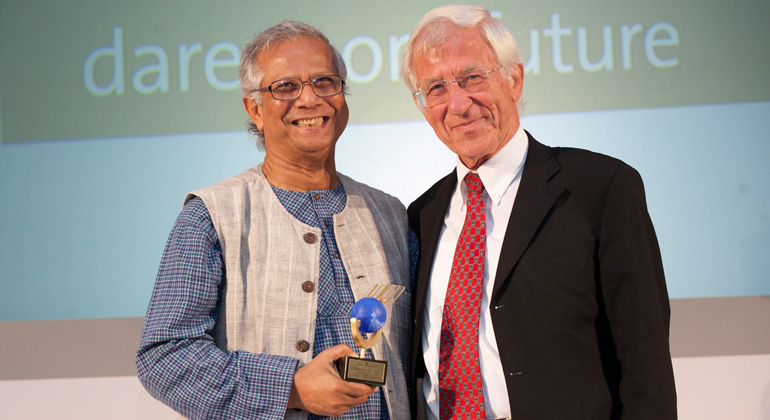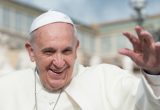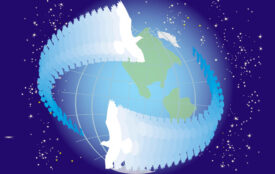Solar pioneer Muhammad Yunus – banker to the poor
When the Nobel Peace Prize winner and founder of the “Bank for the Poor” (Grameenbank), Muhammad Yunus, was commissioned to form a government in Bangladesh these days, he said: “We should invest in overcoming poverty and in climate protection and not in wars and weapons”.
In the poor regions of our world, there is an abundance of solar radiation but a lack of electrical energy. This is a major reason for poverty. I have seen the happiest solar power operators in poor countries such as India, Bangladesh, Somalia and Mali.
Inspired by the German “solar pope” Hermann Scheer, Yunus founded the social enterprise Grameen Shakti (shakti means energy) in Bangladesh after his successful company Grameen Bank, the bank for the poor, and ensured that 1,000 small solar systems were installed on modest dwellings in Bangladesh every day. The new owners of these solar home systems pay as much each month as they previously spent on dirty energy, mostly paraffin or diesel. In this way, the switch to solar energy was achieved without any additional burden. And this burden is usually reduced to zero after three to four years, because then the system is paid off and continues to supply electricity for decades – free of charge, a blessing for the poor. Grameen Shakti has financed and installed more than eight million such systems to date. Grameen Shakti also trains many rural women to become solar technicians. With his “Bank for the Poor”, Yunus mainly helps poor women. This is because 96 per cent of his customers are women – and that in a Muslim country. That alone is a revolution.
I asked Yunus in one of my television programmes how this could be explained. His answer: “Women primarily invest in the family, in children or in a small business, men tend to invest in a motorbike or in cigarettes. The solar industry in Bangladesh is also investing in reconciling economy and ecology and Grameen Bank is investing in exemplary equality. “This is the beginning of a global eco-social market economy,” declared Muhammad Yunus when he received the Nobel Peace Prize in Oslo in 2006. When I presented social entrepreneur and solar entrepreneur Yunus with the “Solarworld Einstein Award” in Valencia in 2010, he also said: “We have so many problems that we have decided to see them as raw material for innovation”. (Photo)
Solar power was also the prerequisite for Muhammad Yunus to recognise the importance of mobile phones in the poor regions of the world. He founded “Telenor”, a kind of co-operative in which the poor were given the opportunity to communicate quickly. The business model was again simple: female credit entrepreneurs from his Grameen Bank sold telephone minutes to fellow villagers in their villages. This enabled them to enquire about appropriate market prices and new marketing channels for their products made with the microloans from Grameenbank. They were thus connected to a new dimension of information, experience, business opportunities and learning. “Telenor” now has almost 80 million customers and is the largest company in Bangladesh. Millions of poor people gain access to the new markets.
Yunus also revolutionised the healthcare system in his country of 170 million inhabitants – something that hardly anyone here knows – which has saved the lives of thousands of people. Grameen Health Care is now the country’s largest trainer of nurses and medical assistants. The successful solution concept: village assistants in rural regions are introduced to healthcare services by urban doctors with the help of smartphones and are trained and educated in these services. Previously, as in many poor countries, there was only one nurse for every four doctors. Today’s healthcare system is much faster, more effective and cheaper. Combining social innovation with solar energy and entrepreneurial imagination is Muhammad Yunus’ great and successful vision.
As a young television reporter, I visited Bangladesh for the first time in 1971 – at that time, the average woman there had between six and eight children. Today the figure is 2.1. Energy is a key driver in overcoming poverty. And poverty is the main reason for too many children everywhere in the world. Thanks to solar energy, most children in Bangladesh can now go to school and leave poverty behind them. Previously, they had no light in the evening to do their homework. During the day, children have to work in the fields so that their families don’t starve. When girls go to school, they learn a trade afterwards and have fewer children than their parents or grandparents. Yunus repeatedly points out these correlations.
“Forbess” included the Nobel Prize winner and solar pioneer Yunus in its list of the “Twelve Greatest Entrepreneurs of Today” and “Business Week” labelled him one of the “Five Greatest Entrepreneurs of All Time”. He stands for the fact that “Economy” and “Ecology”, “Social” and “Business” as well as “Tech Innovation” and “Social Innovation” are only truly successful together. Muhammad Yunus is a great and important creator of a better world. He is a lucky charm in the truest sense of the word. The professor of economics and social entrepreneur repeatedly emphasises that the “we” is more important to him than the “I”. His summary: “It is much more fulfilling and satisfying to use your energy not only for your own livelihood, but also for the common good. If I make money for myself, I’m happy. But if I make other people happy, I’m super happy. You can do both,” says Yunus. He is not the richest banker in the world, but he is the most successful. But he already has a big bank account in heaven. With his mini-loans, he has made a better life possible for billions of people around the world.
Hanser publishing house
It will be exciting to see how the new strong man in Bangladesh translates his convictions into policy. A beacon of hope. The 84-year-old is pushing for early elections after the authoritarian head of government and Yunus enemy Sheikh Hasina failed and fled to India: “Real peace can only come with free elections. There can be no change without elections”
His drive to change the world: “Poverty is artificially created, it is not part of human civilisation, and we can change that. We can put poverty in the museum of history. Grameen Bank is not lending money, we are lending dignity. The poor do not need our pity or gifts. They need loans to help themselves. The right to credit is a human right.
Bildband “The Power of Dignity – The Grameen Family” | Fotos Roger Richter
Source
FRANZ ALT 2024 | Translated with www.DeepL.com/Translator








